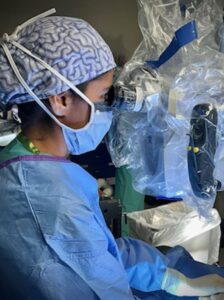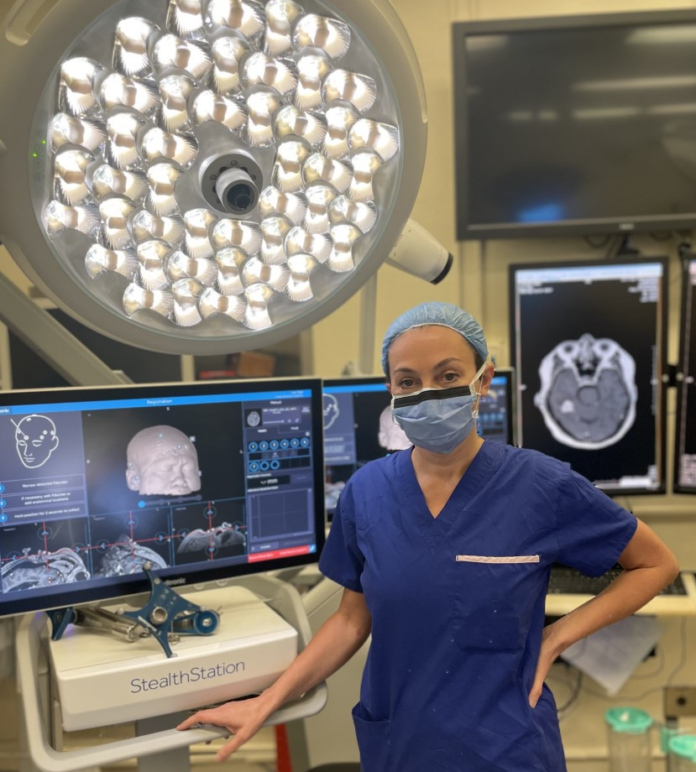Dr. Gelareh Zadeh is a Professor of Neurosurgery, a successful researcher and senior scientist, the first female Chair of Toronto Western Hospital and a mother of two daughters aged 14 and 1.5 years. The interviewer, Dr. Halima Tabani, is a PGY-2 neurosurgery resident at Mount Sinai and mother to a seven-year-old daughter. In this interview, Dr. Zadeh shares her experience of navigating motherhood while pursuing a successful neurosurgical career.
Q: Neurosurgical training is long and rigorous. One of the challenges unique to women in this field is how to strike a balance. What is your ‘secret sauce’ for balancing the demands of your career with motherhood?
It is important to understand that there is no predetermined roadmap in our field, or in general, life. Not one method fits all. People find their own method. Having a strong support system to rely on is the key. In my case, my husband, parents, team members in the hospital and the team I have in my research lab and outstanding administrators who are flexible to my schedule, all play a key role. On a personal level, spending my free time with my children helps me refocus and ground me. Do I have it perfect? Certainly not, there are frustrations, doubts and unknowns. It is a matter of accepting that this is the fact of life.
Q: From my personal experience as a neurosurgical trainee with a young child, I concur that having familial/spousal support is of utmost importance. In addition to personal support systems, what supportive measures do you think are needed at an organizational or institutional level which could have helped you better navigate the challenges that you faced?
There are some pragmatic factors which can make a big difference. For instance, having a dedicated space conducive to all aspects of nursing, having a childcare facility in proximity of the work environment, having backup mechanisms in place while on-call to spend a few hours in the day with your child, amongst other factors, I think make a big difference. It is important to have a safe, clean environment for parent-children interaction, because we work in a hospital, in particular during these pandemic times. I also believe we should foster and embrace the reality that parenting goes beyond females. If we have male residents with children, they need to be able to take equal time off to actively participate in childcare. Countries like Norway with mandatory parental leave for both genders are taking a unique approach to promoting this. Of course we have to figure out how we can avoid these leaves negatively impacting clinical training.
 Additionally, for females in training, residency coincides with their most fertile period. Data suggests lower fertility rates in surgical residents with higher prenatal complications and higher rates of miscarriage. We need to study the contributing factors like high cortisol levels secondary to stress, poor nutrition, poor sleep hygiene, etc. to prevent or minimize its impact in the future for trainee or faculty surgeons planning a family. Traditionally, this mindset or opportunity for discussing these factors has been absent in most training programs, but we are seeing an uptrend in recognizing these factors. The realistic next step is to figure out how training programs can accommodate parental leave without negatively affecting the workflow or compromising individual clinical training.
Additionally, for females in training, residency coincides with their most fertile period. Data suggests lower fertility rates in surgical residents with higher prenatal complications and higher rates of miscarriage. We need to study the contributing factors like high cortisol levels secondary to stress, poor nutrition, poor sleep hygiene, etc. to prevent or minimize its impact in the future for trainee or faculty surgeons planning a family. Traditionally, this mindset or opportunity for discussing these factors has been absent in most training programs, but we are seeing an uptrend in recognizing these factors. The realistic next step is to figure out how training programs can accommodate parental leave without negatively affecting the workflow or compromising individual clinical training.
Q: You had your children at different points in your career. What, if any, are the differences in the obstacles that you faced over a decade ago and now?
I had my first daughter right after completing residency and the second one just recently. I am amazed and impressed with our female trainees who have children during residency and their physical strength and stamina to balance their clinical responsibilities while being pregnant or being a new mother. As faculty, you have more flexibility to control your work hours, however, on the flip side perhaps you have the key responsibility towards your patient and have to be available for them. I think the biggest difference from before to now is that it has become more recognized and acceptable for people to plan their families during training. As a faculty with children, one of the unique challenges for me were the financial implications- with no mechanism for me to generate revenue in a fee-for-service model, it pushed me to go back to work within a month. Not because of personal financial motivation, but because we are all contributing to a group, I felt responsible towards my team and Division members as I did not want to be a burden to my group. Another aspect of it is that as a newly graduated trainee transitioning to a faculty position, I was still building a practice and did not want to lose the referral base. I remember delaying my pregnancy with my second daughter – wanting to build a clinical practice and secure funding for my lab. It would have made a major difference if there were provisions in place to address these anxieties.








